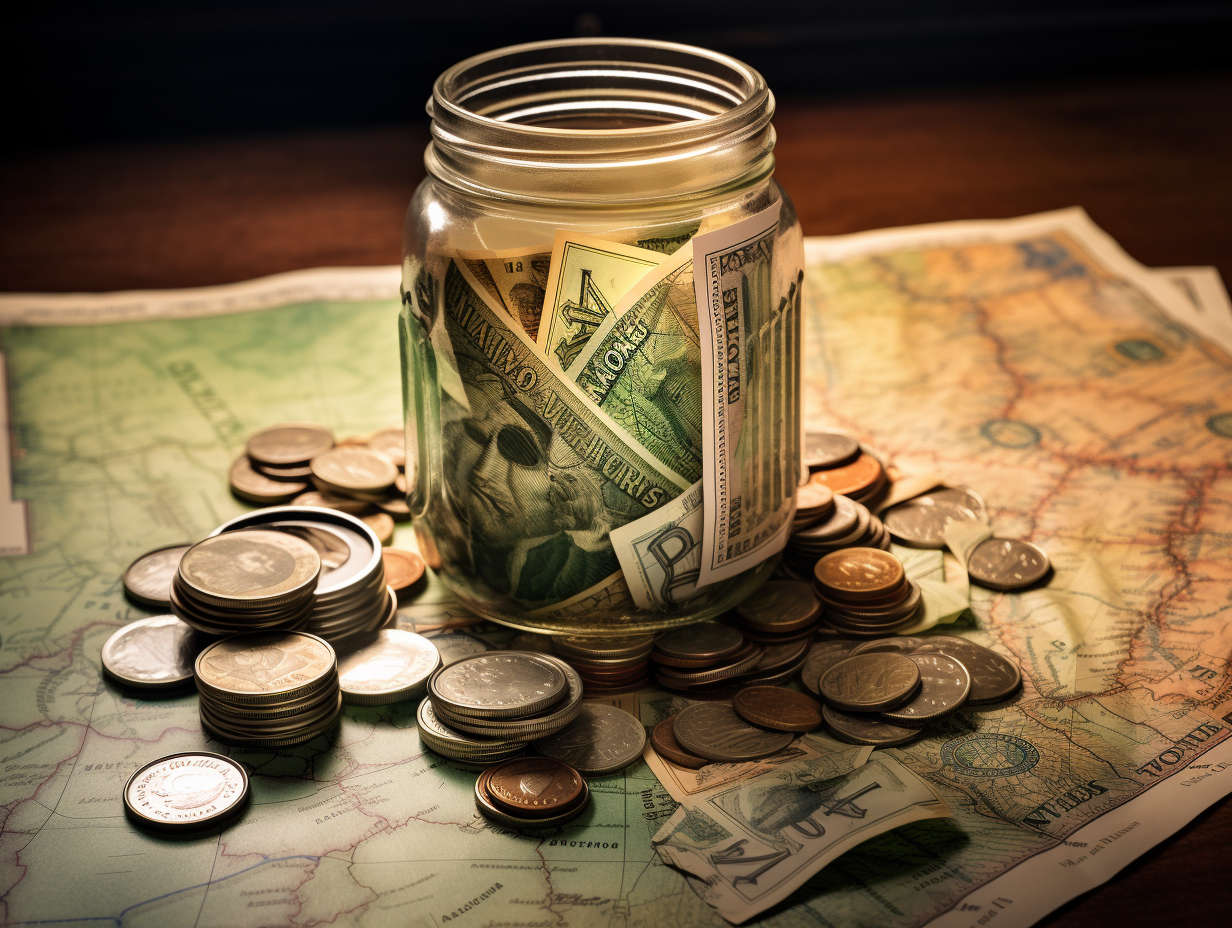Budgeting and Managing Finances on the Road is no walk in the park.
In fact, when it’s time to hit the road for extended periods, travelers’ number one challenge often is…
Budgeting and managing finances on the road.
Many are perplexed about how to budget while traveling. But this is what separates an unprepared traveler from a savvy nomad. If you don’t know how to manage your money effectively while traveling, you’ll never truly enjoy your adventures without financial worries looming over your head.
Maintaining financial health during travel can be tough, folks.
This article is part of a series on the subject of Solo Travel for Men
Consider one solo traveler who shared his story of running out of funds halfway through his journey due to poor budget management. Now he’s hesitant about embarking on long trips again, fearing he might find
Table of Contents:
- Mastering the Art of Money Management on the Road
- Creating a Realistic Travel Budget
- Building an Emergency Fund for Secure Travels
- Staying Financially Disciplined: Paying Bills On-Time Even While Traveling
- Trimming Recurring Charges to Boost Your Travel Budget
- Smart Saving Strategies for Big Purchases During Travel
- Investing Wisely as Part of Your Travel Financial Plan
- Online Tools: Your Financial Wingman While Traveling
- FAQs in Relation to Budgeting and Managing Finances on the Road
- Conclusion
Mastering the Art of Money Management on the Road
Achieving financial goals while globetrotting requires more than just a good income. Gaining insight into your expenditure and being aware of the reasons why you’re shelling out cash are key to successful money management when travelling.
The Role of Spending Awareness in Financial Control
To kickstart great money management skills, begin by tracking your expenses. This can be done manually or with efficient tools like EveryDollar, which offers detailed insights into your daily expenditures.
This awareness helps pinpoint areas for adjustments – perhaps it’s time to cut back on lavish meals or opt for budget-friendly accommodations during travel? Remember that every dollar saved is another one added to your emergency fund or set aside for future adventures.
Beyond keeping tabs on day-to-day costs, consider creating a realistic monthly budget before embarking on any journey. Allocate funds towards all expected expenses – from lodging and food to leisure activities and keepsakes – and set some extra money aside for unexpected expenses.
Incorporating Unexpected Expenses into Your Budget
Travel often comes packed with surprises – both delightful discoveries such as stumbling upon a hidden gem eatery not listed in guidebooks, and less pleasant incidents like sudden vehicle repairs or medical emergencies that can occur unexpectedly when traveling far from home base.
- Prepare For Unforeseen Circumstances
- Predicaments arise without warning during travels; hence having a contingency plan becomes crucially important.
- Maintain A Buffer Fund
- To avoid accumulating interest rates through credit card usage under unforeseen circumstances, include miscellaneous line items within budgets specifically dedicated to unanticipated costs.
With this approach at hand, even if something goes off-track (as things occasionally do), you’ll have peace of mind knowing that potential hurdles are already accounted for within your financial plans.
Key Takeaway:
Track your expenses, plan a realistic budget and always have a buffer fund for unexpected costs while traveling. Awareness of spending habits aids in effective money management on the road, ensuring you’re financially prepared for any surprises along the way.
Creating a Realistic Travel Budget
A realistic travel budget isn’t just about numbers on paper. Crafting a budget for your travels that fits with both your spending habits and financial objectives is the key to having amazing experiences without breaking the bank.
The first rule of thumb in crafting this kind of budget is assigning every dollar a job. This includes both essential and non-essential expenses, from accommodation costs to spur-of-the-moment activities that make traveling truly memorable.
Incorporating Unexpected Expenses into Your Budget
No matter how meticulously we plan our travels, unexpected expenses always find their way into the picture. These could range from emergency medical bills to sudden excursions or experiences too good to pass up while on the road.
To keep these surprise costs from wreaking havoc on your credit card interest rates or dipping into other savings contributions prematurely, it’s wise to include a miscellaneous category within your monthly expenditures specifically for such unpredictable events. EveryDollar, one of many useful money management apps available today, can help track these sporadic spends efficiently so they don’t go unnoticed until it’s too late.
Cutting back where possible is another effective strategy towards building great money management skills over time. Business Insider suggests small changes like reducing dining out frequency or opting for cheaper transport options which might seem insignificant individually but when added up contribute significantly towards achieving financial goals set before embarking upon any journey. Remember – being financially savvy doesn’t necessarily mean compromising lifestyle quality; rather, it means making informed decisions based on personal priorities at each stage along the way.
Craft a realistic travel budget that aligns with your financial goals. Remember to assign every dollar a job, account for unexpected expenses, and cut back where possible without compromising lifestyle quality. #TravelSmart #BudgetingTipsClick to Tweet
Building an Emergency Fund for Secure Travels
The concept of having a financial safety net while on the road is not new. However, many well-off individuals often overlook its importance. An emergency fund serves as your monetary shield against unexpected expenses during travel.
This article will guide you through effective strategies to build and manage this crucial component of great money management skills.
1. Determining Your Emergency Fund Size
Your first task in building an emergency fund is figuring out how much it should contain. This figure varies based on individual lifestyle, monthly expenses, and specific travel plans. Investopedia suggests a good starting point could be three to six months’ worth of living costs saved up.
To reach this goal efficiently without straining your finances excessively, start by setting aside small amounts regularly from each paycheck or extra income until you hit that target number.
2. Regular Contributions: The Key To Growth
In order to achieve financial goals like these, you need discipline and consistency when saving money towards them over time. One way to do so would be scheduling automatic transfers from one bank account into another specifically dedicated for emergencies using EveryDollar.
If there’s leftover cash after paying bills at month-end, it’s best practice to invest those funds back into growing this savings pool even further instead of spending elsewhere unnecessarily. This strategy helps avoid generating interest via credit card use due to a sudden lack of resources during travels.
3. Prudent Usage Of Your Emergency Funds
Emergency reserves are designed primarily to tackle unforeseen situations such as medical problems or major car repairs, not regular expenditure or planned purchases. If used sparingly and wisely, they can significantly reduce reliance on high-interest loans, thereby maintaining a strong on-time payment history and avoiding potential debt accumulation too.
4. Protecting Future Finances With A Solid Safety Net
Apart from immediate relief in crises, an efficient buffer also plays a vital role in long-term fiscal planning
Key Takeaway:
When hitting the road, don’t skimp on your financial safety net. Determine an emergency fund size based on your lifestyle and travel plans, regularly contribute to it, use it wisely for unexpected expenses only, and remember – this monetary shield isn’t just a crisis buffer but also a crucial part of long-term fiscal planning.
Staying Financially Disciplined: Paying Bills On-Time Even While Traveling
Packing your bags and hitting the road shouldn’t mean leaving financial responsibilities behind. One crucial aspect of great money management skills is ensuring that bills are paid on time, even while traveling. This not only helps you avoid late fees but also boosts your credit score.
So how do we maintain this discipline? Automation is key here. Automating bill payments ensures all due amounts are cleared promptly, irrespective of where in the world you might be exploring at any given moment.
Maintaining a Strong On-time Payment History
A flawless record for timely bill payment isn’t just about avoiding penalties; it plays an integral role in shaping up one’s credit history too – contributing nearly 35% to most scoring models according to MyFICO. A higher credit score means better terms when applying for loans or new credit cards.
Besides, punctual payments ensure uninterrupted services like internet connectivity or streaming subscriptions – elements essential for modern-day travel experiences.
Dodging Interest Accumulation through Timely Payments
Certain unpaid dues can start accruing interest over time which adds unnecessary weightage on our finances. For instance, failing to pay off monthly balances on high-interest rate credit cards could result in significant additional costs over time.
To dodge these situations, especially during extensive travels, requires planning ahead but pays dividends by keeping monetary stress at bay while enjoying foreign lands. It’s all about managing and altering as needed.
On the road but still financially responsible. Remember, paying bills on time boosts your credit score and avoids late fees. Automation is your friend here – it ensures timely payments no matter where you’re exploring. #TravelFinance #BudgetingTipsClick to Tweet
Trimming Recurring Charges to Boost Your Travel Budget
If you’re looking to save money and make better spending decisions, reducing recurring charges is an effective strategy. Often overlooked, these expenses can slowly eat away at your finances without offering any real value.
The key here is vigilance – keeping an eye out for monthly deductions that might have slipped under the radar. These could be anything from forgotten subscriptions or services you no longer use.
Detecting Unnecessary Subscriptions: The First Step Towards Savings Goals
To start with this process, examine all outgoing payments in detail over a period of several months. Identify those which are automatically deducted every month and evaluate their worthiness against their cost. EveryDollar, an online tool, allows users to track spending effectively, helping them identify such costs efficiently.
In case there’s a service that hasn’t been used recently but still incurs regular charges, it would make sense to cancel it immediately, saving some bucks each month, adding up significantly over time towards achieving financial goals.
Making Necessary Adjustments by Cutting Back Where Possible
This exercise will likely bring forth easy wins like replacing an old music streaming subscription with a better option or perhaps cutting back on a less-used app that carries a monthly fee. These adjustments result in savings that can contribute directly to your emergency fund, forming part of great money management skills while traveling solo.
Negotiating Lower Rates as Part Of Taking Control Over Finances
Beyond just trimming unnecessary expenditures, negotiating lower rates with existing providers should also be considered where possible. It may require patience and persistence, but the potential long-term rewards make this strategy well worth considering, allowing travelers to avoid generating interest unnecessarily.
So gentlemen. Get ready to roll up your sleeves, take control over your personal finance, make the necessary adjustments, and maintain a strong on-time payment history, paving the way for a smoother journey ahead.
Key Takeaway:
Scrub your budget clean of sneaky recurring charges and forgotten subscriptions to bolster your travel funds. Be vigilant, negotiate lower rates when possible, and make necessary adjustments for a smoother financial journey on the road.
Smart Saving Strategies for Big Purchases During Travel
Navigating the financial waters of major purchases during your travels can be a breeze with strategic planning. Instead of relying on credit cards and accumulating interest, it is recommended to set specific savings goals prior to travel.
This method requires forward-thinking and discipline but pays off in the end. Start by identifying the high-end items or experiences you plan to invest in during your journey. Once these are identified, estimate their costs as accurately as possible.
1. Establish A Dedicated Savings Account
The next step is to open a dedicated savings account. This will help separate funds specifically meant for traveling from regular bank accounts used to cover monthly expenses or emergencies.
To consistently contribute to this fund, set up automatic transfers each month from your primary account into this dedicated one. Over time, these deposits will accumulate, bringing you closer to achieving your financial goals related exclusively to luxurious yet smart traveling habits.
2. Generate Extra Income: Turbocharge Your Travel Fund
In addition to routine contributions from personal income streams, generating extra money can significantly fast-track your progress towards reaching those desired luxury purchases faster than anticipated. Potential options include taking part-time gigs or freelance work, which offer flexibility while still leaving room for relaxation and exploration during your travels. The Penny Hoarder suggests various effective ways to do so.
Moreover, selling unused items before hitting the road could free up space at home while simultaneously adding more funds to your travel budget. This strategy not only provides an opportunity to make some quick cash but also helps in decluttering, which is always beneficial before embarking on any trip.
Remember, the key here isn’t just saving; it’s about optimizing every dollar available through wise spending decisions, making adjustments where necessary, and tracking all transactions using tools like EveryDollar, a great money management app that simplifies budgeting, especially when
Key Takeaway:
Key Takeaway: Savvy travelers can avoid debt by planning for big purchases ahead of time. Establish a dedicated savings account, set up automatic transfers, and explore ways to generate extra income like part-time gigs or selling unused items. Remember to track your spending using budgeting tools for optimal financial management on the road.
Investing Wisely as Part of Your Travel Financial Plan
Achieving financial goals while traveling is not just about managing your spending habits or tracking monthly expenses. It’s also about smart investing.
For travelers looking to bolster their financial standing, an IRA can provide tax advantages that may make it a desirable option. A traditional IRA, for example, allows you to contribute pre-tax dollars that grow tax-deferred until retirement age.
How Investment Can Boost Your Travel Budget
Incorporating a sound investment strategy into your travel plan isn’t a hindrance; it’s an opportunity. The goal here is simple – generate more income without straining your primary bank account or dipping into emergency funds unnecessarily.
Online trading platforms such as Robinhood and E*TRADE make it easy to manage various types of investments including stocks and bonds from anywhere in the world – perfect for those with wanderlust.
Beyond individual stocks, consider putting money regularly into index funds or exchange-traded funds (ETFs). Thanks to compound interest—often dubbed ‘the eighth wonder of the world’—even small amounts invested consistently can yield significant results over time.
- The Power Of Compound Interest:
- If you’re patient enough and keep contributing regularly towards these low-cost options instead of high-interest credit card debt, they have great potential to build up substantial savings and help achieve long-term financial goals even when on the move.
- Making Major Purchases During Travels:
- This additional income stream could be used to cover unexpected costs during travels and allow the freedom to make major purchases without generating unnecessary interest rates on student loans or other debts. So next time you’re planning a trip abroad, don’t forget to include wise investment strategies as part of your overall budget.
Key Takeaway:
Traveling doesn’t mean putting your financial goals on hold. Smart investing, like contributing to an IRA or trading stocks online, can boost your travel budget over time. Remember: patience and regular contributions are key for reaping the benefits of compound interest.
Online Tools: Your Financial Wingman While Traveling
The world of digitalization has made money management while traveling not just possible, but highly efficient. A myriad of online tools exist that can help you keep your spending habits in check and stay on the path to achieving financial goals even when globetrotting.
EveryDollar, for instance, is a user-friendly budgeting tool designed with travelers in mind. It lets you categorize every expense, helping pinpoint areas where overspending might be happening so adjustments can be made accordingly.
This app also allows users to manage multiple bank accounts efficiently – ideal if you maintain separate accounts for daily expenses and savings or investments. With all this information at your fingertips, taking control over finances becomes less daunting.
Gaining The Upper Hand Over Finances On-The-Go
An impressive feature of using an app like EveryDollar is its ability to provide real-time updates about how much dough you’re dropping as it happens. This nifty capability helps avoid unpleasant surprises when checking credit card statements or bank account balances at month-end.
Beyond tracking day-to-day outlays, these apps often have built-in features assisting in setting up savings goals – whether that’s padding an emergency fund or saving up extra money towards making major purchases during travel adventures without resorting to large lump-sum contributions which could throw off monthly budgets.
Digital Assistance: Taking Control Of Your Money Matters
In addition to keeping tabs on expenditure patterns effectively, digital tools are handy aids in ensuring bills get paid promptly whilst gallivanting around the globe – thereby maintaining a strong on-time payment history and steering clear from late fees that would otherwise take bites out of your precious travel funds.
Paying close attention to interest rates across various banks through insights offered by some applications prevents generating unnecessary interest on student loans, credit cards, and other vital aspects of controlling personal finance during travels.
To put it simply, technology empowers us to significantly enhance our capacity for effective money management regardless of the location constraints faced by frequent travelers. The journey towards great money management skills begins here.
Key Takeaway:
Harness the power of digital tools like EveryDollar to streamline your travel budgeting. It’s a real game-changer, providing real-time updates on expenses and helping set savings goals. These apps also ensure timely bill payments and prevent unnecessary interest accruals – making finance management while globetrotting less daunting.
FAQs in Relation to Budgeting and Managing Finances on the Road
How do you budget and manage finances?
Budgeting involves tracking income, setting spending limits, saving for emergencies, paying bills on time, and investing wisely. Managing finances requires discipline to stick to the plan.
What is the 50 30 20 rule for managing money?
The 50-30-20 rule suggests allocating 50% of your income to necessities, 30% towards discretionary items and lifestyle choices, and putting away the remaining 20% as savings.
What are the four simple rules for budgeting?
The four rules include giving every dollar a job (budgeting), embracing your true expenses (saving), rolling with punches (adjustments), and aging your money (spending less than you earn).
What are the seven steps in good budgeting?
The seven steps involve identifying income sources, listing monthly expenses, categorizing them into fixed or variable costs, calculating total earnings vs expenditures, making adjustments if needed, reviewing regularly, and tweaking based on changes in the financial situation.
Conclusion
Mastering the craft of controlling funds and budgeting while travelling is a game-changer.
It all starts with gaining awareness about your spending habits.
A realistic travel budget? That’s your roadmap to financial control.
An emergency fund isn’t just an option, it’s essential for secure travels.
Paying bills on time, even when traveling? It keeps you in good standing financially.
Cutting back on recurring charges can free up more funds for your adventures.
Saving strategies are key for big purchases during travel without breaking the bank.
Incorporating investment into your plan can boost that travel budget further.
Finally, utilizing online tools makes money management while globetrotting a breeze.
Ready to take one step ahead in life and embrace better finance management while enjoying adventurous travels?
Read more about solo traveling for men.




